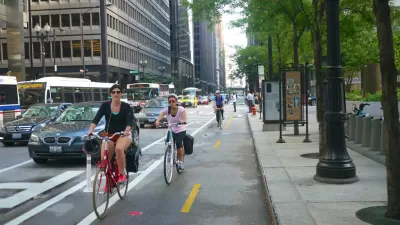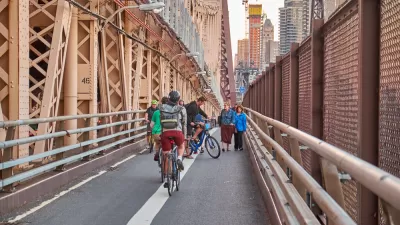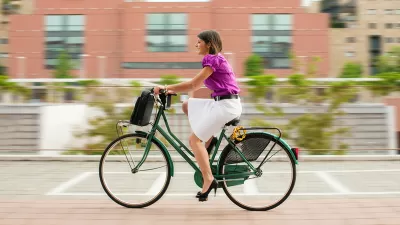Recent research suggests that cyclists of color are more likely to receive citations, but enforcement has little correlation with improved safety.

A new study from Jesus M. Barajas assesses the disproportionate impact of cycling citations on Black and brown communities in Chicago. Some important conclusions: "Tickets were issued 8 times more often per capita in majority Black tracts and 3 times more often in majority Latino tracts compared to majority white tracts. More tickets were issued on major streets, but up to 85% fewer were issued when those streets had bike facilities, which were less prevalent in Black and Latino neighborhoods."
"The high number of tickets in majority Black neighborhoods came despite having the fewest serious bicycle crashes." However, Black neighborhoods "had the highest number of serious crashes of all modes on average," in part due to having "higher shares of streets without bicycle infrastructure compared to majority Asian or white census tracts."
A spatial analysis of tickets suggests that "bicycle tickets are only weakly associated with safety needs, if at all." The study also shows that improved bike infrastructure could reduce citations. "Separated lanes appeared to have the strongest effects. On arterial streets, cyclists received citations 25% as often when there was a separated lane compared to no bicycle infrastructure."
Barajas concludes that "[r]emoving inequities in cycling infrastructure provision, while also ensuring communities are fully represented in bicycle planning processes, is crucial" to any cycling safety strategy.
FULL STORY: Biking where Black: Connecting transportation planning and infrastructure to disproportionate policing

Planetizen Federal Action Tracker
A weekly monitor of how Trump’s orders and actions are impacting planners and planning in America.

The Simple Legislative Tool Transforming Vacant Downtowns
In California, Michigan and Georgia, an easy win is bringing dollars — and delight — back to city centers.

San Francisco's School District Spent $105M To Build Affordable Housing for Teachers — And That's Just the Beginning
SFUSD joins a growing list of school districts using their land holdings to address housing affordability challenges faced by their own employees.

In More Metros Than You’d Think, Suburbs are Now More Expensive Than the City
If you're moving to the burbs to save on square footage, data shows you should think again.

The States Losing Rural Delivery Rooms at an Alarming Pace
In some states, as few as 9% of rural hospitals still deliver babies. As a result, rising pre-term births, no adequate pre-term care and "harrowing" close calls are a growing reality.

The Small South Asian Republic Going all in on EVs
Thanks to one simple policy change less than five years ago, 65% of new cars in this Himalayan country are now electric.
Urban Design for Planners 1: Software Tools
This six-course series explores essential urban design concepts using open source software and equips planners with the tools they need to participate fully in the urban design process.
Planning for Universal Design
Learn the tools for implementing Universal Design in planning regulations.
Smith Gee Studio
City of Charlotte
City of Camden Redevelopment Agency
City of Astoria
Transportation Research & Education Center (TREC) at Portland State University
US High Speed Rail Association
City of Camden Redevelopment Agency
Municipality of Princeton (NJ)





























